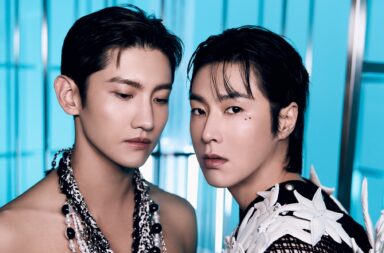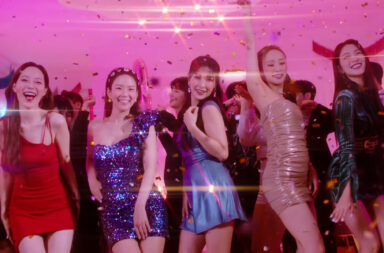 In the ten years that Seoulbeats has been online, there have been thousands of articles published. Music video and album reviews, and drama and film reviews are probably the most written types of articles on Seoulbeats. Then there is the myriad of Seoulbeats Segments and other special content, such as FYVP, Mixtapes, Buzzbeats, concert reviews and interviews (such as the Epik High interview from eons ago). Of course, we also have plenty of socio-cultural articles spanning a myriad of topics. Not all of our articles are crowd pleasers (yes, we are talking about The Infamous Key Article), but that just comes with the territory.
In the ten years that Seoulbeats has been online, there have been thousands of articles published. Music video and album reviews, and drama and film reviews are probably the most written types of articles on Seoulbeats. Then there is the myriad of Seoulbeats Segments and other special content, such as FYVP, Mixtapes, Buzzbeats, concert reviews and interviews (such as the Epik High interview from eons ago). Of course, we also have plenty of socio-cultural articles spanning a myriad of topics. Not all of our articles are crowd pleasers (yes, we are talking about The Infamous Key Article), but that just comes with the territory.
For this Roundtable, we ask the writers: what are your favorite Seoulbeats articles ever? What is it that makes this article stand the test of time, or keep a special place in your K-pop loving heart? In an additional twist, we also ask our writers to include one that they’ve written.
Cjontai: I don’t think anyone can forget Mark‘s infamous rap battle posts. They are hilarious. It was equally amusing reading confused comments by our readers who might have been a bit slow on the take. Mixed messages aside, I just enjoyed reading his impression of each rapper and all of the disses the “rappers” threw at each other. Not everyone can expertly create a duel of the rap gods, Minho and Hyuna. I miss those a lot.
I also love when our writers delve deep into a subject for a better understanding of the situation at hand. Qian wrote a well-researched article about the KBS and MBC media strikes that provided a lot of insight into the issue. I appreciate that he explained how powerful figures were infringing on freedom of the press, which I thought was enlightening. For international fans, this kind of information helps us gain more knowledge about how things work in South Korean entertainment.
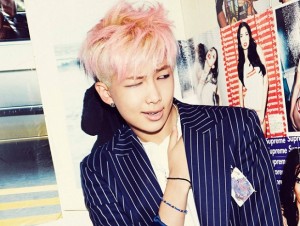 In the four years, I’ve been with Seoulbeats, I’ve written over 150 articles. Some of those are my favorite, too, in particular, my response to RM‘s death threats during BTS‘ Red Bullet tour. I’m surprised to see the amount of comments it has gotten since 2015. I found it meaningful when fans wrote their thoughts on the matter, and how my article reflected some of their feelings. Fun fact: I wrote that article in a fit of fury after reading about what happened. I didn’t even expect it to be published because I was too pissed to properly proofread it and just needed to rant. Furthermore, I thought I’d be told to shut up yet again because trolls love to tell us not to discuss the messy aspects of K-pop. I’m glad I wrote it because it reminded me why I joined Seoulbeats: I wanted to express my opinion outside of the comment section.
In the four years, I’ve been with Seoulbeats, I’ve written over 150 articles. Some of those are my favorite, too, in particular, my response to RM‘s death threats during BTS‘ Red Bullet tour. I’m surprised to see the amount of comments it has gotten since 2015. I found it meaningful when fans wrote their thoughts on the matter, and how my article reflected some of their feelings. Fun fact: I wrote that article in a fit of fury after reading about what happened. I didn’t even expect it to be published because I was too pissed to properly proofread it and just needed to rant. Furthermore, I thought I’d be told to shut up yet again because trolls love to tell us not to discuss the messy aspects of K-pop. I’m glad I wrote it because it reminded me why I joined Seoulbeats: I wanted to express my opinion outside of the comment section.
Chelsea: Yes to all of Mark’s epic rap battles. I’m still amused when they are mistaken as real tracks and lyrics.
I’ve always loved Seoulbeats’ more humorous takes on fandom life. When thinking of articles that had me nodding my head in agreement but also laughing along, Nabeela’s candid take on the pure enjoyment of smut will always be a favorite. She covered so many facets of fanfiction—both hilarious and cringe-worthy—and I will never forget the line, “K-pop is all foreplay and no orgasm.” As someone who kept my fanfiction habit a secret for a long time, reading that article was a breath of fresh air.
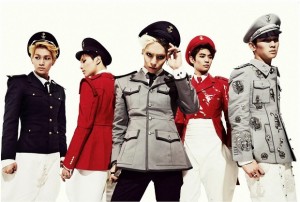 On a more serious note, my eyes were opened to the implications of military fashion with Laura’s piece on Nazi Chic fashion in K-pop. Before that article, I’d never paid much mind to military fashion in K-pop—specifically Shinee‘s “Everybody” promotions—and wrote it off as a concept and nothing more. However, the article highlighted the lack of understanding of the history of clothing that is often seen in K-pop styling. It’s not only seen in accidental Nazi fashion but also many other concepts and cultures that are appropriated, often incorrectly, without context. And while some may say that we harp on cultural appropriation too often at Seoulbeats, I think it’s articles like this that allow for conversations and awareness to actually be raised.
On a more serious note, my eyes were opened to the implications of military fashion with Laura’s piece on Nazi Chic fashion in K-pop. Before that article, I’d never paid much mind to military fashion in K-pop—specifically Shinee‘s “Everybody” promotions—and wrote it off as a concept and nothing more. However, the article highlighted the lack of understanding of the history of clothing that is often seen in K-pop styling. It’s not only seen in accidental Nazi fashion but also many other concepts and cultures that are appropriated, often incorrectly, without context. And while some may say that we harp on cultural appropriation too often at Seoulbeats, I think it’s articles like this that allow for conversations and awareness to actually be raised.
After writing for Seoulbeats for nearly four years, it’s almost impossible to keep track of the articles I’ve written, much less have a favorite. However, after reflection, I think the topic I’m most proud of tackling was violence disguised as teen angst in boy group MVs. It had been a theme I’d noticed before in music videos, but couldn’t quite put words to until the release of Got7‘s “If You Do.” Beyond simply calling out the escalation of violence from props to female bodies, I think the article itself started a good conversation about how violence function in music videos—especially those dealing with emotional pain. While the focus was on boy groups, I later partially answered my own question about whether the same kind of violence could exist in female-lead MV’s in the form of my review of “Get It,” so the discussion still lives on.
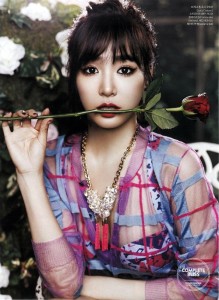 Pat: Like Chelsea, I too love when Seoulbeats gets a bit humorous with all aspects of K-pop – sometimes, you just have to unclench and laugh at the hilariousness of everything. A prime example of this is the Produce 101 Support Group series. The first PD101 set the tone for the next iterations, and it was a fun mess all the way through. That it needed more than one person to even get through the evil editing and the mere concept of the show made the Support Group an essential part of my experience.
Pat: Like Chelsea, I too love when Seoulbeats gets a bit humorous with all aspects of K-pop – sometimes, you just have to unclench and laugh at the hilariousness of everything. A prime example of this is the Produce 101 Support Group series. The first PD101 set the tone for the next iterations, and it was a fun mess all the way through. That it needed more than one person to even get through the evil editing and the mere concept of the show made the Support Group an essential part of my experience.
As much as I hate to admit it, I didn’t really connect with VIXX‘s “Shangri-La” for a couple of days. It was pretty, but I also couldn’t understand the symbolism used, or why there was a deer (still don’t, tbh), or why there was a peach. I loved the visuals, the song, the surreal beauty of the music video, and the dance, but the MV was so different from what I expected from VIXX. I finally got around to reading Qing’s review of the MV, and everything finally clicked. It thus becomes automatically clear that this MV is steeped in references to a classical Chinese poem, and with South Korea being part of the Sinosphere or the East Asian cultural sphere, it all made sense.
Finally, for my own article, it was hard to pick. I ended up going with one that I enjoyed writing: my Tiffany Rising Sun article. Hard to believe, but I wrote this one in the middle of the night and in three hours. I was just so pumped for this because I could use my International Politics degree. East Asian politics has always intrigued me, and this article was so fun to write because of that, albeit also a bit gruesome when it came to the Unit 731 portion and having to get scholarly sources for it. Nonetheless, this article is one of the few I was able to use my degree for K-pop, making it a favorite of mine.
 Qing: Pat, I think the deer is there because it often appears in traditional East Asian paintings. It’s a favored subject because it symbolizes longevity, but “Shangri-La” probably uses it for the immediate aesthetic connection, rather than for its symbolism.
Qing: Pat, I think the deer is there because it often appears in traditional East Asian paintings. It’s a favored subject because it symbolizes longevity, but “Shangri-La” probably uses it for the immediate aesthetic connection, rather than for its symbolism.
In our last Roundtable, I mentioned some memorable articles from my early days as a Seoulbeats reader. They got me interested in the site, but reviews that delve into socio-cultural aspects of releases helped me to connect with Seoulbeats on an even deeper level. Chelsea’s “When Boys in Love Turn Violent” forever changed the way I look at male aggression in MVs. Despite my feminist interests, it never occurred to me what the implications of glorifying violence as “charisma” would be. I probably wouldn’t have been able to analyze Mamamoo‘s “Decalcomanie” if it weren’t for Chelsea’s illuminating article.
There are also amazing reviews that focus solely on the release itself. I love Twice‘s bubbly personalities and their energy as performers. They aren’t the most competent vocalists, but I’ve enjoyed their singing on Sugar Man and certain B-sides. So why do most of their songs grate so badly? Lo’s review of Signal explained it, balancing a heavy dose of the frustration we feel as fans with the astute observations and technical knowledge of a music reviewer.
 Every now and then, you run into a release or topic that you just can’t sit still thinking about; you simply can’t not write about it. That’s how I came to review Sistar ft. Giorgio Moroder‘s “One More Day.” It bricked me on the head with its complexity and artistry, reaching deep with its message about domestic abuse and same-sex love. Yet, it was all delivered in such a raw, accessible form. I was able to bring my film studies knowledge into explaining the care taken in making the MV, and the review helped me realize that the K-pop MV is really an art form.
Every now and then, you run into a release or topic that you just can’t sit still thinking about; you simply can’t not write about it. That’s how I came to review Sistar ft. Giorgio Moroder‘s “One More Day.” It bricked me on the head with its complexity and artistry, reaching deep with its message about domestic abuse and same-sex love. Yet, it was all delivered in such a raw, accessible form. I was able to bring my film studies knowledge into explaining the care taken in making the MV, and the review helped me realize that the K-pop MV is really an art form.
Camiele (Cy): There have been quite a few articles I’m partial to. To keep the list from becoming obnoxiously long, I’ll point out three. The first is the article that attracted me to Seoulbeats, a guest article written about Filipino actress Charice. The writer explored the LGBT community in Asia, particularly South Korea, and how Charice coming out may have a positive impact. At that point, I didn’t realize just how polarizing one’s sexuality was in South Korea. It made me determined to be more actively involved in Korean culture.
There are so many articles that cover issues many fans are still wont to ignore: colorism, racism, Islamaphobia. All are insightful and have forced many to consider how painful it can be to be a non-Korean or non-white/non-Christian/non-straight fan of Korean music. Particularly every discussion we’ve had about colorism and racism has left me conflicted and at times flat-out angry and fed up with some of our readers. So I’ll go with something more fun: Mark’s review of BgA‘s (Boys Generally Asian) debut. If that isn’t the greatest phenomenon in K-pop, I don’t know what is. There are no words. BgA had the potential to completely change K-pop. I miss them so much! BRING THEM BACK!
 As far as a piece of mine…? I loved writing the Indie Gem pieces because it’s an aspect of Korean music very close to my heart. I can’t choose just one! I’m most known for reviews. Maybe one of my best reviews was for Jonghyun‘s She Is. That album completely knocked me on my ass. At that point more than any other, I knew anything Jonghyun dropped I was going to be anxious to get my hands on.
As far as a piece of mine…? I loved writing the Indie Gem pieces because it’s an aspect of Korean music very close to my heart. I can’t choose just one! I’m most known for reviews. Maybe one of my best reviews was for Jonghyun‘s She Is. That album completely knocked me on my ass. At that point more than any other, I knew anything Jonghyun dropped I was going to be anxious to get my hands on.
Gaya: Yes, yes, yes to all of the articles mentioned here! You can safely assume they are already added to my list. Aside from these, one of my favorite articles ever is Maria’s Counterpoint: Sexual Hyuna Fighting! It put into words a lot of the thoughts swirling around my head about Hyuna and the treatment of her sexy image in direct contrast to Ga-in‘s. I just love counterpoints in general as they give writers the chance to express differing opinions on a topic. We aren’t a hivemind, and counterpoints are one way we can show that. Another way we get to celebrate our diversity is by bringing our own perspectives into K-pop discourse, be it in more serious discussions about discrimination or more creative endeavors like Alolika’s 6 Classics of Indian Literature K-pop Could Adapt. Sure, the chances of culturally sensitive adaptation happening can be worrying, but there is something freeing about relating K-pop to our own unique life experiences and learning from others doing the same.
While there have been a few articles that I would pick out as showcasing key moments in my development as a writer, the one I am settling for here is Park Yoochun: Crimes and Lessons to be Learned. I remember how overwhelming the multiple accusations of sexual assault against Yoochun were, not to mention the massive media circus surrounding the matter. It was easy to get sucked into all the speculation, but once I realized that what I wanted most from the article was for people to be more conscious of consent, it was much easier to cut through the crap. The legal system has given its verdict and people are free to think what they want about Yoochun himself, but as the #metoo movement has highlighted this is much bigger than one person and there is something we can all do to prevent this from happening, and it is my hope that everyone who read that article was able to take on that message.
Those were some of our favorite articles! What are yours? Let us know in the comments below!
(Images via Leesha, SM Entertainment, Starship Entertainment, Cube Entertainment, Big Hit Entertainment, RBW Entertainment, 1st Look)
